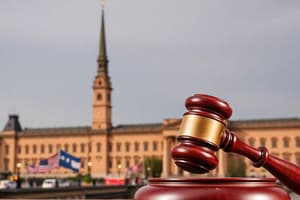Podcast
Questions and Answers
Which phase of the pathway to violence includes research and planning?
Which phase of the pathway to violence includes research and planning?
- Phase I - Radicalization
- Phase III - Execution
- Phase IV - Aftermath
- Phase II - Mobilization (correct)
What is the primary focus of the Terrorist Screening Center (TSC)?
What is the primary focus of the Terrorist Screening Center (TSC)?
- Document and report encounters to prevent future attacks (correct)
- Prevent cyber attacks
- Conduct physical searches at borders
- Coordinate with local law enforcement for community outreach
What characterizes the anti-terrorism strategy?
What characterizes the anti-terrorism strategy?
- Defensive measures to reduce vulnerability to attacks (correct)
- Covert operations to infiltrate terrorist groups
- Offensive actions to disrupt terrorist networks
- Negotiation with terrorist organizations
Which agency primarily leads the counterterrorism strategy?
Which agency primarily leads the counterterrorism strategy?
What are the four factors contributing to the grievance phase of radicalization?
What are the four factors contributing to the grievance phase of radicalization?
Which of the following is NOT a reason to be cautious about someone's status as a diplomat?
Which of the following is NOT a reason to be cautious about someone's status as a diplomat?
Which of the following scenarios DOES NOT require immediate notification of a foreign national's consulate?
Which of the following scenarios DOES NOT require immediate notification of a foreign national's consulate?
Which code level represents the most common scenario when encountering a foreign national on the Terrorist Screening Center (TSC) list?
Which code level represents the most common scenario when encountering a foreign national on the Terrorist Screening Center (TSC) list?
What is the primary focus of the Anti-Terrorism Strategy?
What is the primary focus of the Anti-Terrorism Strategy?
Which factor is NOT directly involved in the 'Ideation' phase of the pathway to violence?
Which factor is NOT directly involved in the 'Ideation' phase of the pathway to violence?
Which agency plays a key role in combating terrorism by directly investigating and disrupting terrorist threats?
Which agency plays a key role in combating terrorism by directly investigating and disrupting terrorist threats?
What is the main objective of the 'Mobilization' phase of the pathway to violence?
What is the main objective of the 'Mobilization' phase of the pathway to violence?
What must be done if a foreign national is arrested from a nation that is not on the mandatory notification list?
What must be done if a foreign national is arrested from a nation that is not on the mandatory notification list?
What should happen after verifying a diplomat's status?
What should happen after verifying a diplomat's status?
Which of the following best describes targeted violence?
Which of the following best describes targeted violence?
Which factor is considered the least reliable sense for perception among individuals under stress?
Which factor is considered the least reliable sense for perception among individuals under stress?
What characterizes foreign terrorist organizations according to the definition provided?
What characterizes foreign terrorist organizations according to the definition provided?
Which of the following best reflects the purpose of the Center for Prevention Programs and Partnerships (CP3)?
Which of the following best reflects the purpose of the Center for Prevention Programs and Partnerships (CP3)?
What is the significance of a Code I designation on the Terrorist Screening Center (TSC) list?
What is the significance of a Code I designation on the Terrorist Screening Center (TSC) list?
Which of the following actions is considered part of the "Mobilization" phase of the pathway to violence?
Which of the following actions is considered part of the "Mobilization" phase of the pathway to violence?
Which of the following is NOT a primary objective of the Counterterrorism Strategy?
Which of the following is NOT a primary objective of the Counterterrorism Strategy?
According to the provided content, what is the main role of the Joint Terrorism Task Force (JTTF)?
According to the provided content, what is the main role of the Joint Terrorism Task Force (JTTF)?
What is the primary difference between targeted violence and acts of terrorism, as defined in the content?
What is the primary difference between targeted violence and acts of terrorism, as defined in the content?
Which of the following is NOT a characteristic of a foreign terrorist organization (FTO) as defined in the content?
Which of the following is NOT a characteristic of a foreign terrorist organization (FTO) as defined in the content?
According to the content, which of the following would NOT be considered an indicator of a possible diplomatic status for a person?
According to the content, which of the following would NOT be considered an indicator of a possible diplomatic status for a person?
Which of the following factors has the LEAST impact on a person's rational thinking under stress?
Which of the following factors has the LEAST impact on a person's rational thinking under stress?
Flashcards
FTO (Foreign Terrorist Organization)
FTO (Foreign Terrorist Organization)
A designation by the US Government that classifies an individual or group as a foreign terrorist organization. This designation restricts their travel and criminalizes providing them with any material support.
Pathway to Violence
Pathway to Violence
A process that involves a series of steps leading to violence. It often involves individuals becoming radicalized, mobilizing and ultimately committing acts of terrorism.
Counterterrorism Strategy
Counterterrorism Strategy
This strategy involves direct and indirect actions taken against terrorist networks to disrupt their activities and make their operations more difficult.
Anti-terrorism Strategy
Anti-terrorism Strategy
Signup and view all the flashcards
Terrorist Screening Center (TSC)
Terrorist Screening Center (TSC)
Signup and view all the flashcards
Vienna Convention on Consular Relations
Vienna Convention on Consular Relations
Signup and view all the flashcards
Mandatory Notification List
Mandatory Notification List
Signup and view all the flashcards
Diplomatic Immunity
Diplomatic Immunity
Signup and view all the flashcards
Targeted Violence
Targeted Violence
Signup and view all the flashcards
Foreign Terrorist Organization (FTO)
Foreign Terrorist Organization (FTO)
Signup and view all the flashcards
Factor contributing to Radicalization
Factor contributing to Radicalization
Signup and view all the flashcards
What is a Foreign Terrorist Organization (FTO)?
What is a Foreign Terrorist Organization (FTO)?
Signup and view all the flashcards
What is the mandatory notification rule for foreign nationals?
What is the mandatory notification rule for foreign nationals?
Signup and view all the flashcards
What is diplomatic immunity?
What is diplomatic immunity?
Signup and view all the flashcards
What is the Vienna Convention on Consular Relations?
What is the Vienna Convention on Consular Relations?
Signup and view all the flashcards
What is targeted violence?
What is targeted violence?
Signup and view all the flashcards
Radicalization
Radicalization
Signup and view all the flashcards
Center for Prevention Programs and Partnerships (CP3)
Center for Prevention Programs and Partnerships (CP3)
Signup and view all the flashcards
Study Notes
Vienna Convention on Consular Relations
- Foreign nationals arrested/detained must be notified of their right to contact their consulate.
- If the foreign national wants consular notification, the arresting officer must contact the nearest consulate without delay.
- If the nation is on a mandatory notification list, the consulate must be notified when a foreign national is arrested, regardless of their wishes.
- Established procedures for handling arrested foreign nationals.
- Basic Rule: If a nation is not on the mandatory notification list, the arrested/detained person must be notified of their rights to access their consulate. If they want their consulate notified, the officer must contact the nearest consulate promptly.
- Special Rule: If a nation is on the mandatory notification list, the consulate must be notified when a foreign national is arrested regardless of the foreign national's wishes.
Diplomatic Immunity
- Diplomats are not subject to US court jurisdiction for official or (mostly) personal activities. They should not be arrested.
- Verify diplomatic status by contacting the Department of State's Diplomatic Security Command Center (DSCC).
- After verification, do not arrest. Investigate, prepare a report, and only use handcuffs if absolutely necessary. Search only when necessary.
Identifying Suspicious Individuals
- Circumstantial Conditions: Notice unusual colors, vehicles, attire/tattoos/piercings, movements, activity changes, or sexualized behavior.
- Ambient Conditions: Assess environment, weather, lighting, and noise levels.
- Stress and Perception: Recognize how physical and psychological stress can affect perception. Physical stress impacts perception less than other types of stress. Seeing is the most reliable sense, then hearing.
- Vantage Points: Be aware of viewing angles that can distort perception.
Targeted Violence
- Characterized by goal-directed, predatory actions against specific individuals or groups, often lacking an ideological motive. Different from terrorism due to intent.
Foreign Terrorist Organizations (FTOs)
- Two or more people from a foreign country, engaged in terrorist acts, designated by the US Department of State.
- FTO designation impacts travel, and restricts material support.
Pathway to Violence
- Phase I: Radicalization
- Driven by personal, group, sociopolitical, and ideological grievances, and development of extremist ideologies.
- Phase II: Mobilization
- Involves research, planning, preparation, probing, and breaching.
Counterterrorism Strategy
- Direct Actions: FBI-led efforts to disrupt terrorist networks globally.
- Joint Terrorism Task Force (JTTF): Federal and local law enforcement collaborate to investigate and disrupt threats. Proactive contact and familiarity with JTTF officers is encouraged.
- Anti-terrorism Strategy: Defensive measures to reduce vulnerabilities. Largely a DHS mission (strengthening borders, infrastructure, cyberspace).
Center for Prevention Programs and Partnerships (CP3)
- Addresses the root causes of violent extremism.
- Provides resources and supports local prevention efforts.
Cybersecurity & Infrastructure Security Agency (CISA)
- Works with partners to secure infrastructure and defend against attacks.
Terrorist Screening Center (TSC) Handling Codes
- Code I (Worst): Federal warrant exists; immediately report contact with TSC.
- Code II: Possible immigration violation; contact TSC.
- Code III (Most Common): Gather information, do not extend encounters unnecessarily; call after the encounter.
- Code IV & V: Gather information, call after the encounter.
Studying That Suits You
Use AI to generate personalized quizzes and flashcards to suit your learning preferences.




